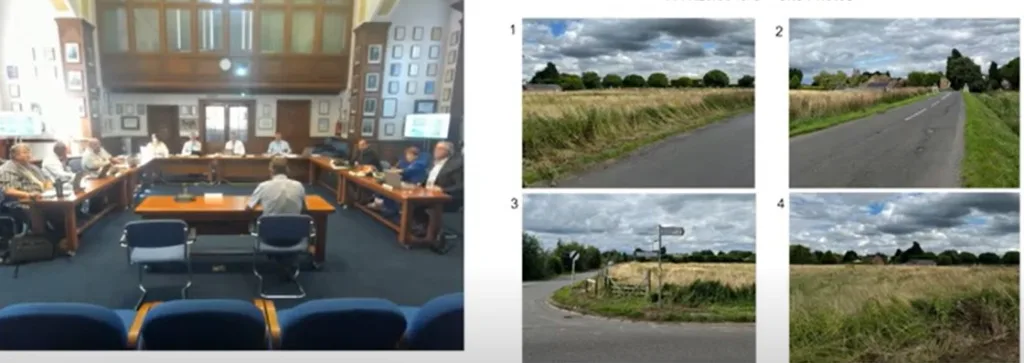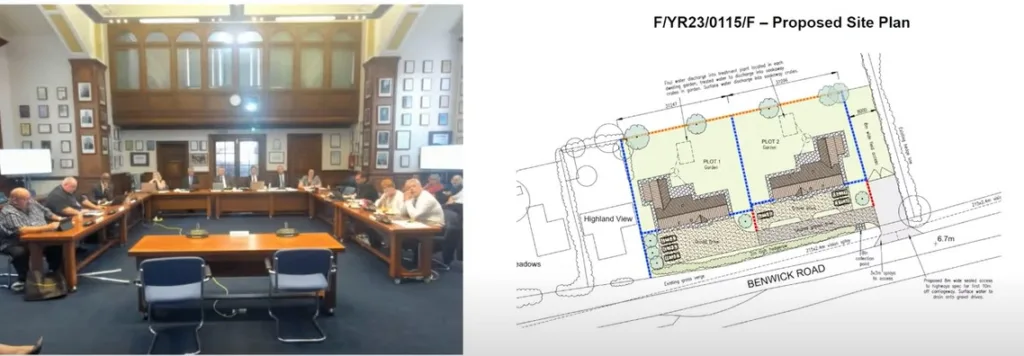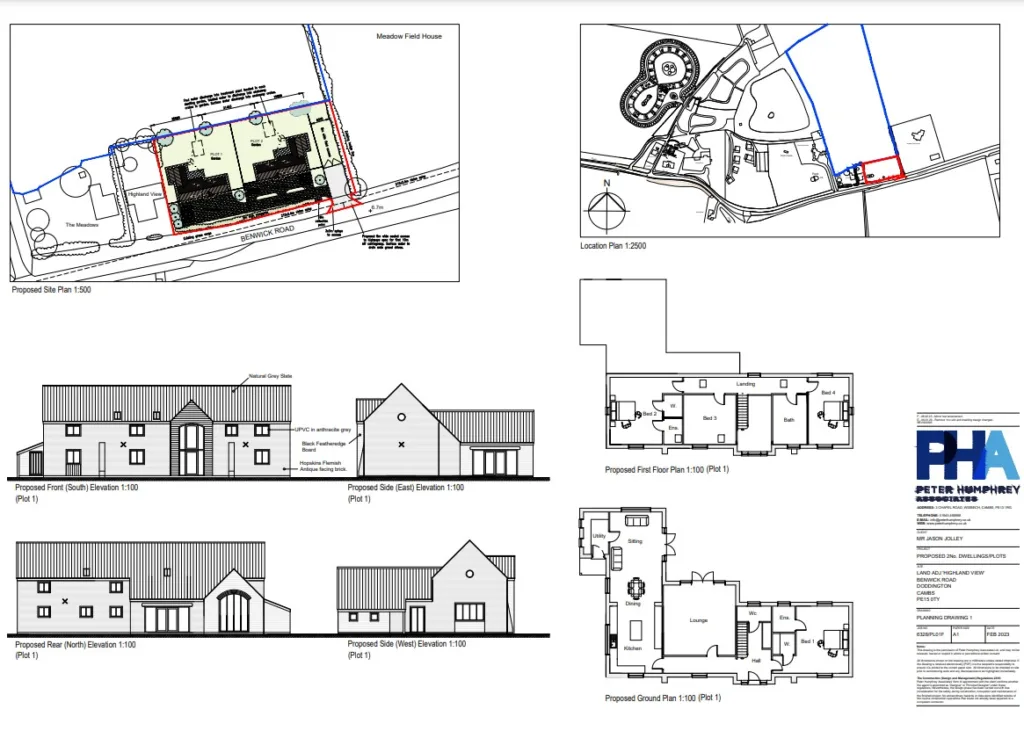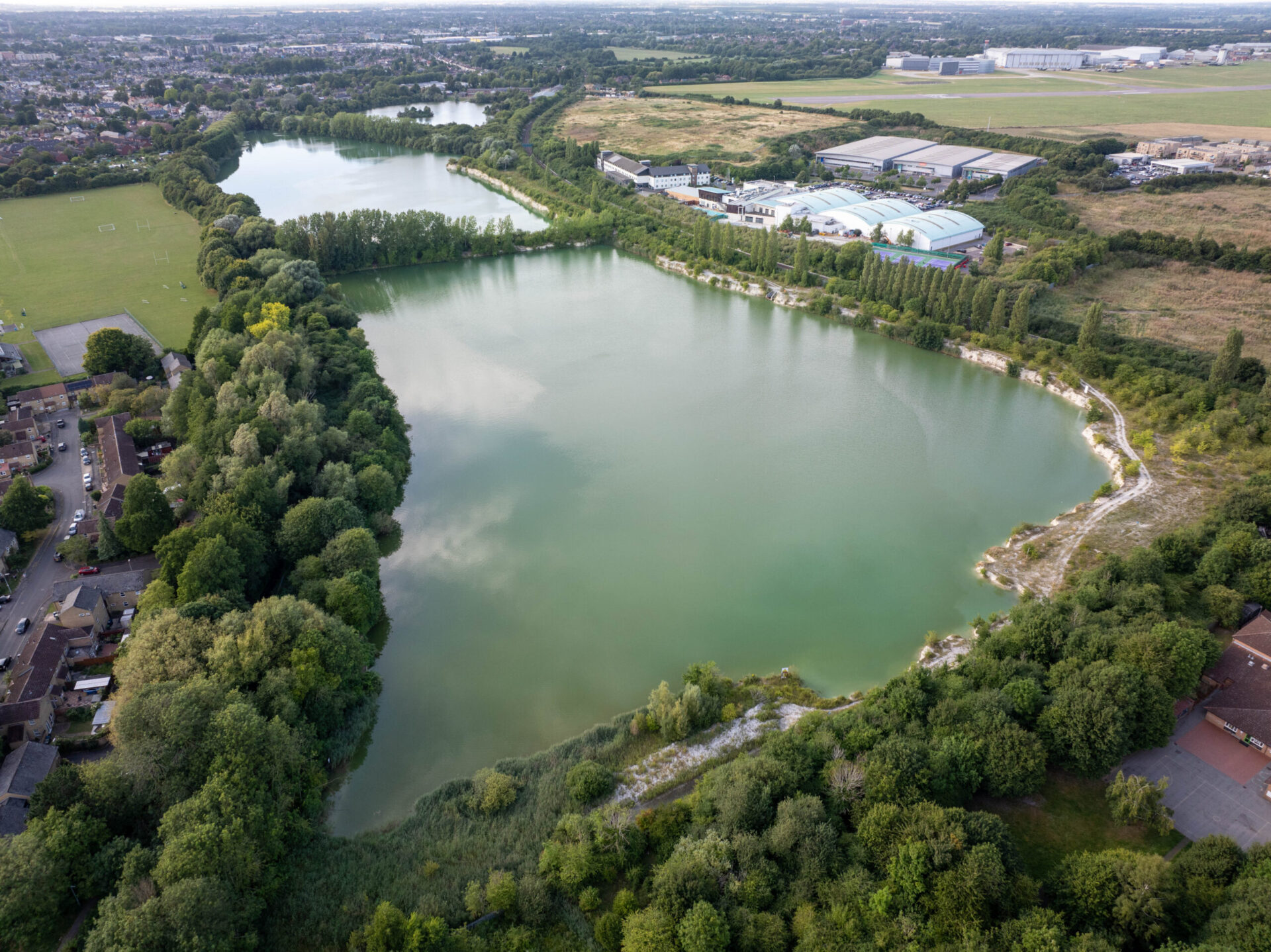Councillors on the new, slimmed down (7 members instead of 11) planning committee of Fenland District Council have been warned they have breached the council’s code of conduct over their handling of two recent applications.
In extraordinary scenes, rarely witnessed at a local authority planning committee, the chief planning officer and the council’s own legal adviser warned councillors of ditching planning policy to approve applications in Doddington and Gorefield.
Both applications were recommended for refusal by officers who claimed no sound planning policies had been advanced by the committee to alter those recommendations.
But alter them they did, despite being warned by the council’s legal officer on one of the applications that a judicial review “has power to order payment, compensation and publicly declare the council is guilty of maladministration.
“I’m sure your members wouldn’t want that to happen but that might happen if you ignore your own code of practice “.
Cllr Ian Benney, a planning committee member, and cabinet member for economic growth and skills, dished the possibility of a judicial review.

“Legally who’s going to challenge it, who’s going to put the money up for a JR on this one,” he said.
“And really if they do no councillor has ever been sent to prison for making a wrong decision.”
Ironically in the case of the Doddington application, the committee felt the parish council’s support for the housing was a key factor in allowing the homes to go ahead.
But in Gorefield the committee took no note of the parish council’s view that concurred with the Fenland Council planning officers’ assessment to refuse.
The first example of the planning committee ditching officers’ recommendations came during the July meeting when two 4-bedroom homes were being proposed for land east of Highland View, Benwick Road, Doddington.
Peter Humphrey, the agent for the applicant Jason Jolley, pointed out that the previous application that the council had refused was for three houses on the site.
The committee was told it was back for a fresh decision as officers were obliged to do so if letters of support were more than six, and if they opposed officers’ recommendations. Six letters of support came from Doddington residents and another from a Chatteris family who farm opposite the field.
Mr Humphrey pointed out that the site sits between four other homes and further out of the village the council has agreed Field End caravan park with 20 caravan pitches, 4 glamping pods, toilet block, a further application for 18 caravan pitches plus 30 caravan pitches, toilet block, 2 log cabins, car park, treatment plant, 8 log cabins plus a 4-bed house.
He said it “hardly demonstrates” in his view open countryside, with all of them being further away from the village.
The committee was told the application was refused last year for contravention of policies, including a countryside location and its urbanising impact.
“The proposal has not overcome reasons for previous refusal,” the committee was told.
But Cllr Benney said the previous application had been refused by a different planning committee and this time the application was supported by the parish council
“So much as it is building in the opening countryside, Doddington parish council seems to want this one,” he said.
“They are a serious consultee, and they support this; they must see some merit in it but much as it’s got recommendation to refuse, we have the parish council supporting it and that road will eventually be filled in with houses. “
Planning chief Nick Harding advised councillors to consider the code of conduct which he said refers to the issue of “perversity and maladministration” if the planning committees cannot show a change in circumstances.

He said the adopted local plan indicates settlement hierarchy and development strategy “and this is clearly a location which is not in the local plan.
“There are only a limited number of circumstances in which this can be approved, and this is not one of those, an elsewhere location”.
He had no idea what consideration the parish council had given to the local plan or national policies and the council did not know the context of their recommendation.
“Nothing has changed since the last refusal, just because it’s a new committee this does not give you leverage to arrive at a different decision, decisions must be based on what circumstances have changed since you last considered the application,” he said.
Legal officer Stephen Turnbull explained that change of membership of a committee “does not absolve need for consistency”.
The committee was legally obliged to take account of planning policies local and national, bound to follow planning policy and that was “simply what the law says – you have to have good reasons to depart from planning policy”.

Cllr Benney retorted: “We have got a different committee and it’s the committee makes decisions here – we get a recommendation and it’s not that we are going against officers we just interpret things in a different way.
“It is ultimately members who make the decision.
“We have to come up with the reasons why, but we are told time and again each application is judged on its merits. The decision rests with members of the committee and that will be determined when we have a vote.”
A vote to accept the officers’ recommendation refusal was lost and then Cllr Benney won approval of a second motion to go against officers’ recommendation and allow the homes to be built.
“I propose we go against,” said Cllr Benney.
“The area is classed as part of Doddington and not in countryside and not harming the environment.
“I don’t see how these houses will be detrimental to the area; it’s a good solid application and we have a new committee and solid application.”
Mr Harding argued that Cllr Benney had not addressed the change of circumstances and it was, effectively, nonsense to claim the site as being part of Doddington.
“You could not say this area forms part of the settlement of the village; it is clearly divorced and separated.
“My concern is that it is a very exceptional and liberal interpretation of settlement and goes against the local plan.”
Although he had real concerns over the committee arriving a new decision “it just does not make sense in my professional opinion”
Mr Turnbull advised that by not giving adequate planning reasons, there was a risk of challenge “should anyone wish to challenge”.
The council had “very few grounds to defend itself” from being in breach of the code of conduct which advises consistency irrespective of changes in committee.
“There are risks in going ahead – I’m not sure we can say anymore,” he said.
“We can’t stop you voting.”
Cllr Benney proposed, and the council’s deputy leader Jan French seconded it. It was carried.
In August the committee had before them an application from McDermott Residential Property Ltd – also refused last year – for five homes on land west of 176 High Road, Gorefield.
The application had 10 letters of support received from 8 addresses within Gorefield (x5), Leverington (x2) and Upwell (x1).
The site is opposite the fruit packing business premises known as Newling Fruitgrowers Ltd.
Unlike Doddington, where the new committee was enthusiastic about support from the parish council, not so here.
“Gorefield Parish Council does not support this application; it is development in the open countryside, the site has flooding problems and one of the accesses is directly next to the junction with Hassockhill Drove,” the committee was told.
It didn’t stop the planning committee rejecting the planning officers recommendation to refuse, instead substituting it with a recommendation of approval, which succeeded.
Cllr Gavin Booth urged the committee to “listen” to the parish council, but it fell on deaf ears.
It was not clear from the poor quality of the online meeting which officer was speaking when he said: “I just want to draw members attention to the code of practice which I think was mentioned at the last committee meeting and what the planning code of practice says for those who are not familiar.”
He said members faced a “serious risk of challenge” posed by failure to give and record clear and convincing planning reasons for the approval of planning applications where there is a history of refusals by the council.
“And in this case, we have a very recent refusal which is within the last 12 months.
“The code of practice also says that if the council is minded to approving an application previously refused the proposal of the motion must state what significant change in planning circumstances has occurred since the previous decision.”
Cllr Benney, however, again reminded officers that he sat on a new planning committee where there were “different people who have different perceptions”
But the unnamed officer again reminded the committee that “a significant change in the membership of the planning committee does not justify inconsistency between current and previous decisions”.
Cllr Benney said: “So here we are again in a situation where the proposal to refuse it has been rejected, we are now in a position where another proposal is probably going to be put on the table and we have to come up with reasons.
“The thing is we have got another committee.
“People’s opinions change and as much as what has changed maybe significantly not but the opinion of the decision makers has changed.
“And because the opinion of the decision makers has changed how do you get around that one because if the committee has voted that they don’t that they don’t want to refuse this, and they do want to approve it how do you get around that one.
“It looks like the committee want to approve this. It cannot be where things can be stuck forever where things cannot change, we cannot not have change because does this mean for the next 200 years this site will never be built on because things do change the application itself hasn’t, but we are in a position where the committee wants to approve this or maybe we’ll find out when it comes to a vote
“So, in terms of code of conduct we are where we are members will vote whichever way it could be that somebody will put a proposal forward to change to approve this application and members could change their mind and matter about that that proposal could fail and then we have to go back to another proposal which would then be to refuse it that’s really where we are
“Ultimately yes, we talk of the code of conduct which came up in conversation last month and has come up again this month but legally who’s going to challenge it.
“Who’s going to put the money up for a JR on this one and really if they do no councillor has ever been sent to prison for making a wrong decision.
“It will be the council that picks the bill up – so that’s where we are, and you know if it goes to the point, and it then becomes an approved decision it may not sit right with a code of conduct, but we will be where we are if members vote that way.
“How do we get around that line?”
Officers warned that changes can be made to the local plan, indeed are being considered, but the committee had to go with what’s here now.
“The council has to be consistent in this decision making so this, if it came before a planning inspector who looked at the council’s project now having refused it last year with no change in circumstances it’ll be seen as a fairly eccentric decision and not consistent with previous decisions
“I’m not saying that you must approve this recommendation to refuse this application, but I have to point this out this it’s not my code but just your code of practice written by your members and that’s what it says”.
Warning of the threat of the council facing a judicial review, he also warned the council could be ordered to pay compensation “and publicly declare the council is guilty of maladministration.
“I’m sure your members wouldn’t want that to happen but that might happen, if you ignore your own code of practice.”
The Gorefield application was approved, contrary to officers’ recommendation to refuse it.
Cllr Jan French (left) and Cllr Ian Benney, key Cabinet members and both members of the planning committee at Fenland Council that has shrunk from 11 members to only 7.



















